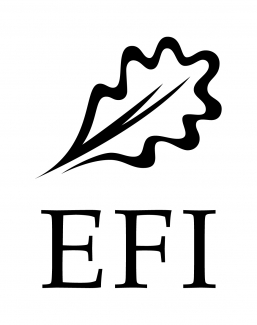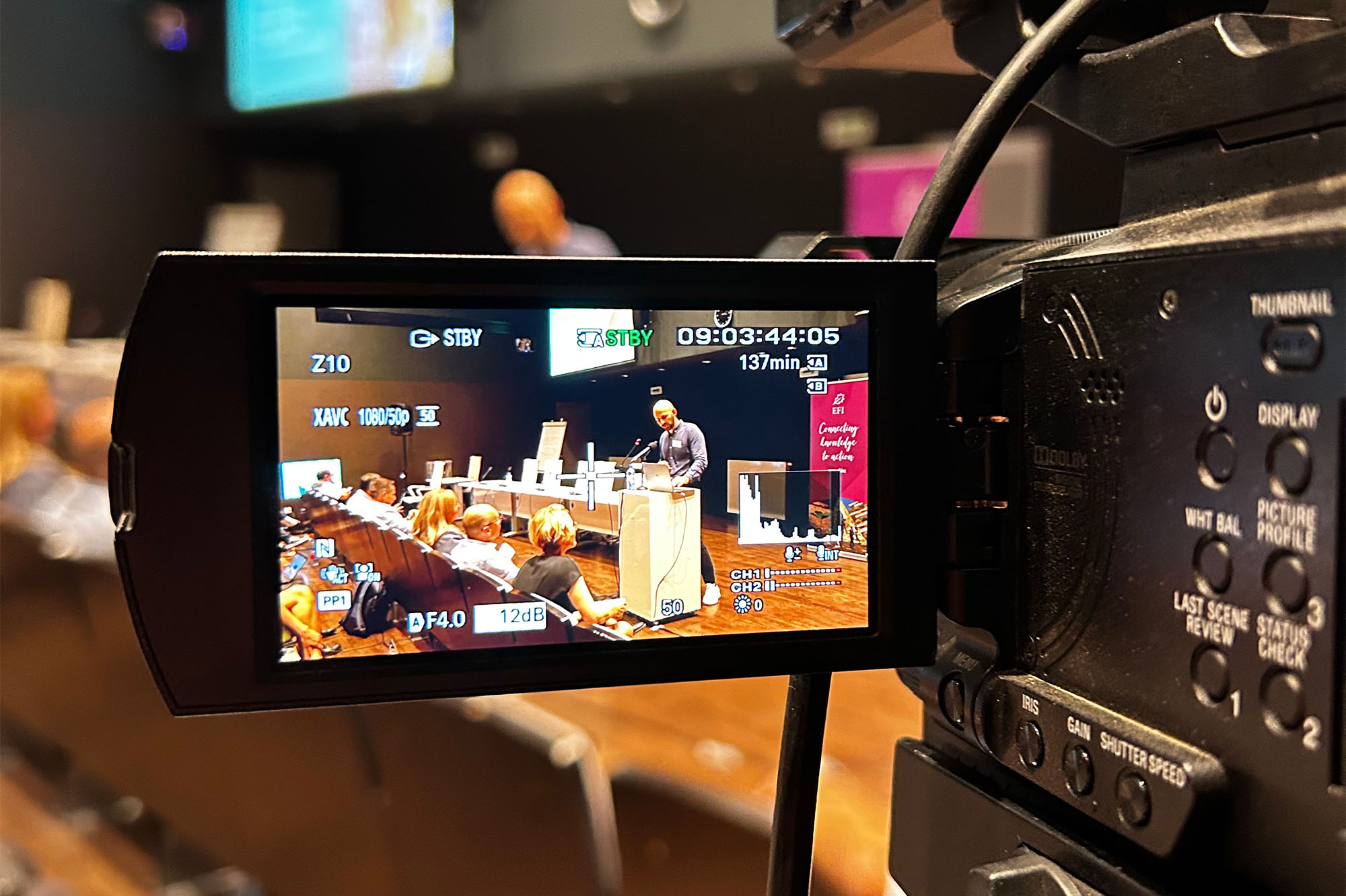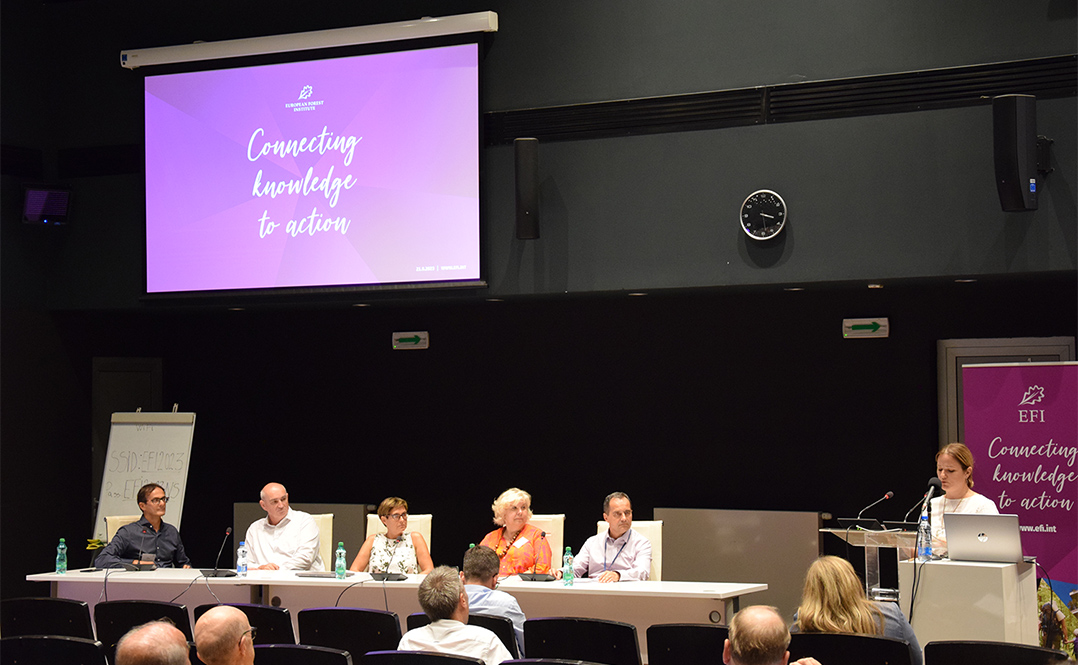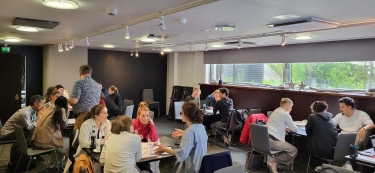European forests and forest science: transition to the future

EFI’s Scientific Seminar on 21 September looked into the future of forest research. Synergies and trade-offs emerged as the vitally important issue across all three themes of forest resilience, forest bioeconomy and forest governance. Who wins, who loses and what are the implications were discussed with a lively audience.
Summing up the day’s discussions, Professor Bart Muys from KU Leuven explained that forest science of the future must:
- Transfer evidence-based knowledge
- Expand from the forest to the landscape, to interdisciplinary collaboration
- Explore transdisciplinarity, and include stakeholders with co-creation
- Explore the unexplored – focus on gaps and build capacities to address geographical bias
- Consider long-term perspectives – for example going beyond 2050
- Embrace complexity and consider dynamics and uncertainty
- Develop synergies between bioeconomy and biodiversity
- Include wellbeing and inequality in bioeconomy
- Explore the forestry impacts of other dynamics like demographics.
Forest science in the past decades
Understanding the past can help us to understand the future, said Professor Niels Strange, from the University of Copenhagen. He demonstrated the mapping of knowledge and trends in forest-related research literature, which is being carried out within the Horizon Europe project EUFORE. Large-scale systematic literature reviews remain rare, and there has been no previous attempt to map the whole sector. He explored some of the trends in keywords over the last two decades, for example the rise in usage of terms such as “climate change” and “machine learning”, as well as a decline in usage of “biomass”. The next steps include expanding from the current analysis of approximately 35,000 reviews to including more than a million scientific articles.
Future research on forest resilience
Dr Elena Cantarello from Bournemouth University explored some of the challenges future research in forest resilience can help to deal with. Fostering resilience in three areas (engineering resilience, ecological resilience and socio-ecological resilience) can be a solution to dealing with uncertainty. However, the scientific literature at the moment is not directly addressing these three areas – in future, resilience-related research using an operational approach, multidirectional studies, studies and pilot actions testing different adaptive strategies, and studies with a focus on win-wins and trade-offs are needed.
A moderated discussion with the audience led by Prof. Dr. Magda Bou Dagher Kharrat (EFI) touched on the trade-offs between different time scales and spatial scales. What is desirable now may not be desirable in the future, due to changing societal needs. Another challenge is that research is often case study based, using different models and different disturbances. It is therefore important to underline the complexity of the topic when talking with policymakers, and to clarify and use the term ‘resilience’ correctly.
Future research on forest bioeconomy
Professor Lauri Hetemäki from the University of Helsinki looked at the concepts of synergies and trade-offs in forest bioeconomy research via a literature review from 2012-2022 (i.e. since the first EU Bioeconomy strategy was published). This showed that there is a need for more research on this very scarcely researched topic. Future research should be cross-sectoral and cross disciplinary, addressing the whole forest bioeconomy value chain, not just part of it. The impact of time and spatial scale is also important for synergies and trade-offs – and researchers should be careful when they draw wide-ranging policy implications from limited models and geographical scopes.
A moderated discussion with the audience led by Dr Diana Tuomasjukka (EFI) emphasized that studies are currently very narrow and should go beyond to look at societal impact. In addition, trade-offs appear in the literature much more than synergies – there is a clear need for more research on eg cultural services and tourism.
Future research on forest governance
Professor Georg Winkel from Wageningen University and Research explored five major global forest frontiers, to create possible questions for future research on forest governance. These themes included land-use change, conservation/use, rights and justice, urbanization and climate change. We need to go beyond current policy agendas to understand long-term patterns and engage with society to diversify perspectives and connect more to natural science and economics, he said. We are still lacking understanding of policy impacts, and this needs interdisciplinary collaboration.
A moderated discussion with the audience led by Valérie Merckx (EFI) highlighted again the issues of synergies and trade-offs, how to develop adaptive governance systems in the forest sector (particularly as forests run in longer cycles than governance), and how the seldom considered frontier of demographic change could be an area of research to consider.
Building a European forest research area
Mika Kallio from the Ministry of Agriculture and Forestry of Finland explained the present and future of forest research coordination in the EU, and in particular the concept of ‘partnerships’. He traced the journey through ERA-NETs to ForestValue2, and beyond to the new European Partnerships, which bring private and public partners together to launch joint RDI calls and develop activities linked to a Strategic Research and Innovation Agenda. A European Partnership on ‘Forests and Forestry for a Sustainable Future’ is currently being developed, which if approved would run from 2025 – 2031.
Dr Alex Giurca from EFI presented the EUFORE (European Forest Research and Innovation Ecosystem) Horizon Europe project, whose aim is to support the preparation of the European Partnership on Forests and Forestry. EUFORE is working with stakeholders to co-create a strategic research and investment agenda for forestry and the forest-based sector, and a roadmap for funding.
Challenges for forest research in South East Europe
A panel discussion with representatives from Slovenia (Dr Nike Krajnc, Slovenian Forestry Institute), Croatia (Dr Sanja Perić, Croatian Forest Institute), Serbia (Dr Saša Orlović, Institute of Lowland Forestry and Environment), Macedonia (Prof Kiril Sotirovski, Ss Cyril and Methodius University in Skopje), and Bosnia and Herzegovina (Prof. Dr. Ahmet Lojo, University of Sarajevo) explored current collaboration on forest research in South East Europe. Moderated by Dr Ivana Zivojinovic (University of Natural Resources and Life Sciences (BOKU)), the panel discussed some of the main challenges, including funding and difficulties getting young people to enter the forest sector. The panelists welcomed opportunities to be a partner in larger scientific networks and projects, and to collaborate and exchange information both within the region and beyond. Education was highlighted as important for reaching new generations. In return, the region offers many opportunities for potential collaboration and cooperation eg forest genetic resources to help with climate change adaptation across Europe.
Photos: Satu Ikonen-Williams, Martina Zoric




